North
Carolina State University
2003 First-Year Student Survey Data Tables:
Gender and Racial/Ethnic Comparisons of
Goals for Undergraduate Education
This document reports gender and racial/ethnic differences in the respondents' mean rating of their current development of and importance given to general education, personal development, and world view goals. Frequency distributions of responses by gender and race/ethnicity are available in "2003 First Year Student Survey: Frequency Distributions of Survey Item #18 (Goals)." For information about the survey and analysis methods, see " 2003 First-Year Student Survey: Introduction, Methods, and Student Demographic Profile." Exact question wording is available on the web or by clicking on the "Q" next to the table heading.
Current Level of Development | Level
of Goal Importance | Scatterplots: Comparison of Goals Ratings
QCurrent
Development
| General Education Goals |
Mean Rating Scale: 5="very high," 4="high," 3="average," 2="low," 1="very low" |
|||||
| All | Women | Men | Af. Am | White | Other | |
| Good listening skills | 3.76 | 3.91 | 3.65 | 3.94 | 3.75 | 3.87 |
| Plan/carry out project independently | 3.73 | 3.88 | 3.62 | 3.82 | 3.73 | 3.83 |
| Apply mathematics skills | 3.72 | 3.56 | 3.84 | 3.68 | 3.72 | 3.87 |
| Broad general education | 3.70 | 3.75 | 3.67 | 3.89 | 3.68 | 3.87 |
| Develop computer skills | 3.60 | 3.48 | 3.69 | 3.82 | 3.57 | 4.00 |
| Understand diverse cultures | 3.59 | 3.78 | 3.45 | 4.12 | 3.50 | 3.82 |
| Critically analyze info. | 3.58 | 3.57 | 3.59 | 3.69 | 3.57 | 3.61 |
| Understand scientific influence | 3.57 | 3.37 | 3.72 | 3.56 | 3.57 | 3.26 |
| Good reading comprehension skills | 3.52 | 3.60 | 3.47 | 3.77 | 3.51 | 3.73 |
| Communicate ideas orally | 3.47 | 3.52 | 3.42 | 3.68 | 3.45 | 3.52 |
| Apply scientific principles | 3.35 | 3.14 | 3.51 | 3.35 | 3.34 | 3.59 |
| Communicate in writing | 3.35 | 3.47 | 3.27 | 3.56 | 3.33 | 3.57 |
| All | Women | Men | Af. Am | White | Other | |
| Taking responsibility for behavior | 4.22 | 4.35 | 4.12 | 4.48 | 4.19 | 4.00 |
| Learning as a lifelong process | 4.04 | 4.17 | 3.93 | 4.31 | 4.00 | 4.04 |
| Acting upon ethical principles | 3.94 | 4.07 | 3.85 | 4.13 | 3.92 | 3.96 |
| Function as part of a team | 3.92 | 4.03 | 3.83 | 4.17 | 3.89 | 3.87 |
| Being independent and self-reliant | 3.90 | 3.96 | 3.86 | 3.99 | 3.90 | 3.87 |
| Understanding own abilities and interests | 3.83 | 3.87 | 3.80 | 4.12 | 3.80 | 3.87 |
| Realizing my potential for success | 3.77 | 3.80 | 3.76 | 4.16 | 3.73 | 4.00 |
| Having self-discipline | 3.76 | 3.82 | 3.71 | 4.00 | 3.73 | 3.32 |
| Clarifying personal identity | 3.73 | 3.82 | 3.67 | 4.04 | 3.71 | 3.83 |
| Having self-confidence | 3.69 | 3.66 | 3.71 | 4.09 | 3.65 | 3.83 |
| Commitment to health and fitness | 3.64 | 3.68 | 3.61 | 3.80 | 3.64 | 3.57 |
| Improving leadership/management skills | 3.63 | 3.71 | 3.57 | 3.92 | 3.60 | 3.78 |
| Coping with change | 3.59 | 3.58 | 3.60 | 3.88 | 3.56 | 3.57 |
| Handling stress | 3.52 | 3.42 | 3.60 | 3.64 | 3.51 | 3.35 |
| Managing my time | 3.36 | 3.49 | 3.27 | 3.46 | 3.36 | 3.35 |
| Involved with public/community affairs | 3.28 | 3.51 | 3.11 | 3.64 | 3.24 | 3.52 |
| World View Goals | All | Women | Men | Af. Am | White | Other |
| Valuing racial equity | 4.17 | 4.31 | 4.06 | 4.62 | 4.10 | 4.26 |
| Valuing gender equity | 4.15 | 4.33 | 4.01 | 4.50 | 4.10 | 4.17 |
| Interact with diverse people | 3.86 | 4.01 | 3.76 | 4.28 | 3.80 | 3.78 |
| Tolerance for different views | 3.76 | 3.90 | 3.66 | 4.07 | 3.71 | 3.74 |
| Appreciation of the arts | 3.46 | 3.69 | 3.28 | 3.62 | 3.42 | 3.83 |
| World problems/issues | 3.39 | 3.32 | 3.45 | 3.55 | 3.37 | 3.22 |
| Present as it relates to history | 3.30 | 3.19 | 3.39 | 3.46 | 3.28 | 3.17 |
| General Education Goals |
Mean Rating Scale: 5=very important, 4=important, 3=moderately important, 2=of limited importance, 1=not important |
|||||
| All | Women | Men | Af. Am | White | Other | |
| Plan/carry out project independently | 4.34 | 4.48 | 4.24 | 4.53 | 4.32 | 4.22 |
| Broad general education | 4.31 | 4.42 | 4.23 | 4.58 | 4.28 | 4.22 |
| Develop computer skills | 4.27 | 4.25 | 4.29 | 4.52 | 4.25 | 4.00 |
| Communicate ideas orally | 4.26 | 4.41 | 4.16 | 4.61 | 4.23 | 4.26 |
| Good listening skills | 4.23 | 4.40 | 4.11 | 4.60 | 4.19 | 4.26 |
| Apply mathematics skills | 4.21 | 4.10 | 4.29 | 4.45 | 4.18 | 4.04 |
| Critically analyze info. | 4.15 | 4.24 | 4.09 | 4.38 | 4.12 | 4.13 |
| Good reading comprehension skills | 4.14 | 4.27 | 4.04 | 4.61 | 4.07 | 4.35 |
| Understand diverse cultures | 4.02 | 4.28 | 3.82 | 4.50 | 3.95 | 4.27 |
| Understand scientific influence | 4.01 | 3.88 | 4.10 | 4.13 | 3.99 | 3.74 |
| Communicate in writing | 3.95 | 4.14 | 3.80 | 4.44 | 3.88 | 4.17 |
| Apply scientific principles | 3.87 | 3.72 | 3.98 | 4.01 | 3.85 | 3.78 |
| All | Women | Men | Af. Am | White | Other | |
| Managing my time | 4.56 | 4.69 | 4.47 | 4.77 | 4.54 | 4.52 |
| Taking responsibility for behavior | 4.54 | 4.66 | 4.45 | 4.76 | 4.51 | 4.43 |
| Having self-discipline | 4.53 | 4.65 | 4.44 | 4.71 | 4.51 | 4.36 |
| Having self-confidence | 4.51 | 4.63 | 4.41 | 4.77 | 4.47 | 4.70 |
| Being independent and self-reliant | 4.50 | 4.67 | 4.37 | 4.65 | 4.47 | 4.43 |
| Realizing my potential for success | 4.43 | 4.54 | 4.35 | 4.72 | 4.39 | 4.35 |
| Handling stress | 4.42 | 4.58 | 4.30 | 4.63 | 4.40 | 4.35 |
| Understanding own abilities and interests | 4.40 | 4.52 | 4.31 | 4.68 | 4.37 | 4.52 |
| Improving leadership/management skills | 4.37 | 4.46 | 4.30 | 4.66 | 4.33 | 4.39 |
| Commitment to health and fitness | 4.35 | 4.49 | 4.23 | 4.56 | 4.32 | 4.39 |
| Function as part of a team | 4.35 | 4.43 | 4.28 | 4.61 | 4.31 | 4.35 |
| Acting upon ethical principles | 4.32 | 4.47 | 4.22 | 4.55 | 4.30 | 4.48 |
| Learning as a lifelong process | 4.30 | 4.43 | 4.20 | 4.62 | 4.26 | 4.43 |
| Clarifying personal identity | 4.27 | 4.47 | 4.13 | 4.63 | 4.22 | 4.17 |
| Coping with change | 4.23 | 4.41 | 4.10 | 4.54 | 4.19 | 4.35 |
| Involved with public/community affairs | 3.93 | 4.17 | 3.75 | 4.38 | 3.86 | 4.04 |
| World View Goals | All | Women | Men | Af. Am | White | Other |
| Valuing racial equity | 4.39 | 4.56 | 4.26 | 4.80 | 4.33 | 4.43 |
| Valuing gender equity | 4.34 | 4.53 | 4.21 | 4.72 | 4.29 | 4.43 |
| Interact with diverse people | 4.28 | 4.47 | 4.13 | 4.66 | 4.22 | 4.39 |
| Tolerance for different views | 4.25 | 4.44 | 4.11 | 4.50 | 4.21 | 4.48 |
| World problems/issues | 4.14 | 4.28 | 4.04 | 4.32 | 4.11 | 4.13 |
| Present as it relates to history | 3.89 | 3.95 | 3.84 | 4.12 | 3.85 | 3.96 |
| Appreciation of the arts | 3.80 | 4.05 | 3.61 | 4.08 | 3.75 | 4.22 |
Scatterplots: Comparisons of Goal Ratings
Scatterplot Comparing Goal Development and Goal Importance Ratings (All Respondents)
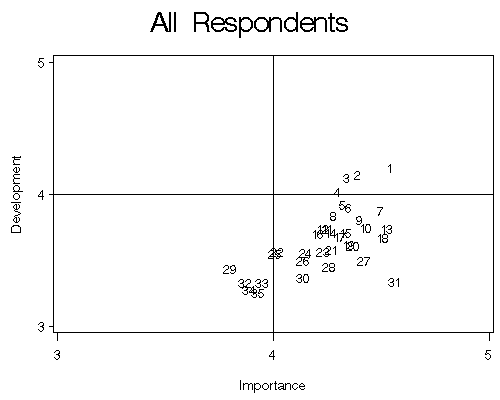
|
1 Taking responsibility for behavior |
19 Commitment to health and fitness |
|
2 Valuing racial equity |
20 Improving leadership/management skills |
|
3 Valuing gender equity |
21 Develop computer skills |
|
4 Learning as a lifelong process |
22 Understand diverse cultures |
|
5 Acting upon ethical principles |
23 Coping with change |
|
6 Function as part of a team |
24 Critically analyze info. |
|
7 Being independent and self-reliant |
25 Understand scientific influence |
|
8 Interact with diverse people |
26 Good reading comprehension |
|
9 Understanding own abilities and interests |
27 Handling stress |
|
10 Realizing my potential for success |
28 Communicate ideas orally |
|
11 Tolerance for different views |
29 Appreciation of the arts |
|
12 Good listening skills |
30 World problems/issues |
|
13 Having self-discipline |
31 Managing my time |
|
14 Clarifying personal identity |
32 Apply scientific principles |
|
15 Plan/carry out project independently |
33 Communicate in writing |
|
16 Apply mathematics skills |
34 Present as it relates to history |
|
17 Broad general education |
35 Involved with public/community affairs |
|
18 Having self-confidence |
Scatterplot Comparing Goal Development and Goal Importance Ratings (Female Respondents)
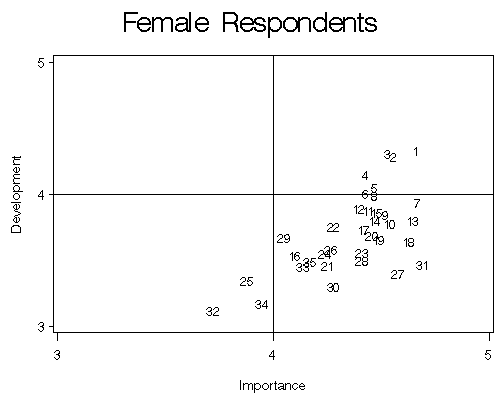
|
1 Taking responsibility for behavior |
19 Commitment to health and fitness |
|
2 Valuing racial equity |
20 Improving leadership/management skills |
|
3 Valuing gender equity |
21 Develop computer skills |
|
4 Learning as a lifelong process |
22 Understand diverse cultures |
|
5 Acting upon ethical principles |
23 Coping with change |
|
6 Function as part of a team |
24 Critically analyze info. |
|
7 Being independent and self-reliant |
25 Understand scientific influence |
|
8 Interact with diverse people |
26 Good reading comprehension |
|
9 Understanding own abilities and interests |
27 Handling stress |
|
10 Realizing my potential for success |
28 Communicate ideas orally |
|
11 Tolerance for different views |
29 Appreciation of the arts |
|
12 Good listening skills |
30 World problems/issues |
|
13 Having self-discipline |
31 Managing my time |
|
14 Clarifying personal identity |
32 Apply scientific principles |
|
15 Plan/carry out project independently |
33 Communicate in writing |
|
16 Apply mathematics skills |
34 Present as it relates to history |
|
17 Broad general education |
35 Involved with public/community affairs |
|
18 Having self-confidence |
Scatterplot Comparing Goal Development and Goal Importance Ratings (Male Respondents)
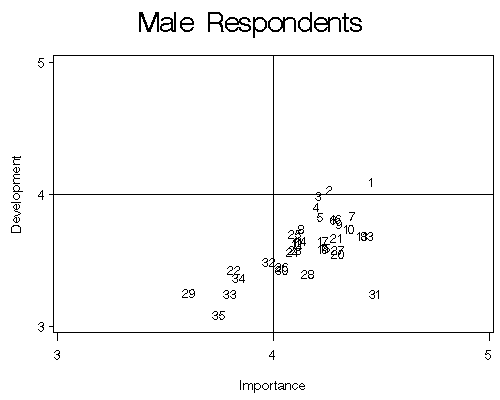
|
1 Taking responsibility for behavior |
19 Commitment to health and fitness |
|
2 Valuing racial equity |
20 Improving leadership/management skills |
|
3 Valuing gender equity |
21 Develop computer skills |
|
4 Learning as a lifelong process |
22 Understand diverse cultures |
|
5 Acting upon ethical principles |
23 Coping with change |
|
6 Function as part of a team |
24 Critically analyze info. |
|
7 Being independent and self-reliant |
25 Understand scientific influence |
|
8 Interact with diverse people |
26 Good reading comprehension |
|
9 Understanding own abilities and interests |
27 Handling stress |
|
10 Realizing my potential for success |
28 Communicate ideas orally |
|
11 Tolerance for different views |
29 Appreciation of the arts |
|
12 Good listening skills |
30 World problems/issues |
|
13 Having self-discipline |
31 Managing my time |
|
14 Clarifying personal identity |
32 Apply scientific principles |
|
15 Plan/carry out project independently |
33 Communicate in writing |
|
16 Apply mathematics skills |
34 Present as it relates to history |
|
17 Broad general education |
35 Involved with public/community affairs |
|
18 Having self-confidence |
Scatterplot Comparing Goal Development and Goal Importance Ratings (African American Respondents)
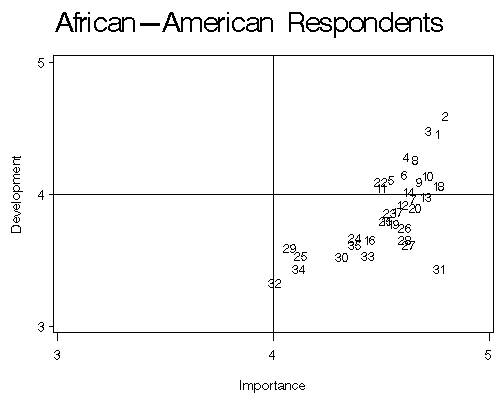
|
1 Taking responsibility for behavior |
19 Commitment to health and fitness |
|
2 Valuing racial equity |
20 Improving leadership/management skills |
|
3 Valuing gender equity |
21 Develop computer skills |
|
4 Learning as a lifelong process |
22 Understand diverse cultures |
|
5 Acting upon ethical principles |
23 Coping with change |
|
6 Function as part of a team |
24 Critically analyze info. |
|
7 Being independent and self-reliant |
25 Understand scientific influence |
|
8 Interact with diverse people |
26 Good reading comprehension |
|
9 Understanding own abilities and interests |
27 Handling stress |
|
10 Realizing my potential for success |
28 Communicate ideas orally |
|
11 Tolerance for different views |
29 Appreciation of the arts |
|
12 Good listening skills |
30 World problems/issues |
|
13 Having self-discipline |
31 Managing my time |
|
14 Clarifying personal identity |
32 Apply scientific principles |
|
15 Plan/carry out project independently |
33 Communicate in writing |
|
16 Apply mathematics skills |
34 Present as it relates to history |
|
17 Broad general education |
35 Involved with public/community affairs |
|
18 Having self-confidence |
Scatterplot Comparing Goal Development and Goal Importance Ratings (White Respondents)
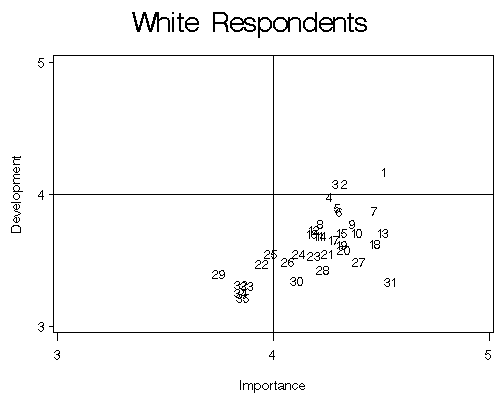
|
1 Taking responsibility for behavior |
19 Commitment to health and fitness |
|
2 Valuing racial equity |
20 Improving leadership/management skills |
|
3 Valuing gender equity |
21 Develop computer skills |
|
4 Learning as a lifelong process |
22 Understand diverse cultures |
|
5 Acting upon ethical principles |
23 Coping with change |
|
6 Function as part of a team |
24 Critically analyze info. |
|
7 Being independent and self-reliant |
25 Understand scientific influence |
|
8 Interact with diverse people |
26 Good reading comprehension |
|
9 Understanding own abilities and interests |
27 Handling stress |
|
10 Realizing my potential for success |
28 Communicate ideas orally |
|
11 Tolerance for different views |
29 Appreciation of the arts |
|
12 Good listening skills |
30 World problems/issues |
|
13 Having self-discipline |
31 Managing my time |
|
14 Clarifying personal identity |
32 Apply scientific principles |
|
15 Plan/carry out project independently |
33 Communicate in writing |
|
16 Apply mathematics skills |
34 Present as it relates to history |
|
17 Broad general education |
35 Involved with public/community affairs |
|
18 Having self-confidence |
Scatterplot Comparing Goal Development and Goal Importance Ratings (Non-African American Minority Respondents)
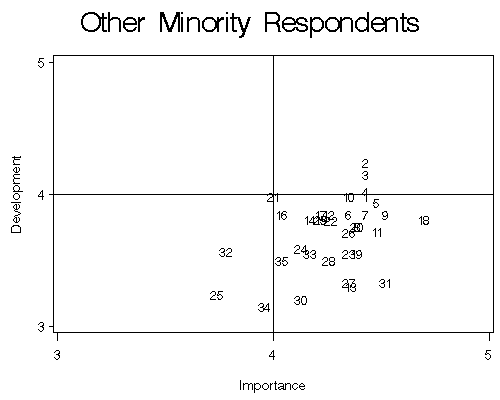
|
1 Taking responsibility for behavior |
19 Commitment to health and fitness |
|
2 Valuing racial equity |
20 Improving leadership/management skills |
|
3 Valuing gender equity |
21 Develop computer skills |
|
4 Learning as a lifelong process |
22 Understand diverse cultures |
|
5 Acting upon ethical principles |
23 Coping with change |
|
6 Function as part of a team |
24 Critically analyze info. |
|
7 Being independent and self-reliant |
25 Understand scientific influence |
|
8 Interact with diverse people |
26 Good reading comprehension |
|
9 Understanding own abilities and interests |
27 Handling stress |
|
10 Realizing my potential for success |
28 Communicate ideas orally |
|
11 Tolerance for different views |
29 Appreciation of the arts |
|
12 Good listening skills |
30 World problems/issues |
|
13 Having self-discipline |
31 Managing my time |
|
14 Clarifying personal identity |
32 Apply scientific principles |
|
15 Plan/carry out project independently |
33 Communicate in writing |
|
16 Apply mathematics skills |
34 Present as it relates to history |
|
17 Broad general education |
35 Involved with public/community affairs |
|
18 Having self-confidence |
For more information on the 2003
First-Year Student Survey contact:
Dr. Nancy Whelchel, Associate Director for Survey Research
Office of Institutional Planning and Research
Box 7002
NCSU
Phone: (919) 515-4184
E-mail: Nancy_Whelchel@ncsu.edu
Posted: January, 2004
Download a Microsoft Excel File of this report.
Return to 2003 First-Year Student Survey Table of Contents Page